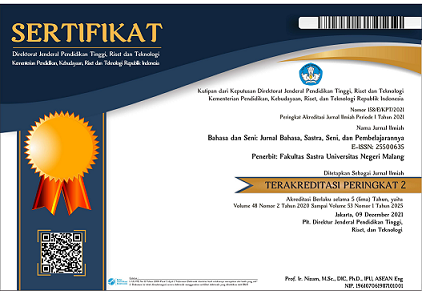THE IMPORTANCE OF CROSS-CULTURAL UNDERSTANDING IN FOREIGN LANGUAGE TEACHING IN THE ASIAN CONTEXT
Abstract
Foreign language learning is not only about grammar or vocabulary but also life skill to be able to communicate. Furthermore, mastering culture along with learning language is essential. Language learners must have knowledge of cultural understanding because every language reflects many kinds of cultures. The same thing can happen between Indonesian and German. If the communication is not good, it could lead to something negative, especially when the communications are related to business cooperation as well as other important partnerships. So, in foreign language learning, teachers must teach the cultures of both the native and foreign language too, so that learners can understand differences between German and Indonesian culture. This research is a kind of literature review research. The literatures were based on the result of previous studies on cultural differences in verbal communication between German and Indonesian culture. It is also supported by observing and studying reference system to generate appropriate learning strategies. The study reveals that there are various strategies that can be implemented to enable students to understand cultural differences. There is some cultural knowledge in communications which can be given by providing information, while some others need to be practiced in the classroom and also to be applied in the real communication practices. In learning and understanding cultural differences, we can focus on the empowerment of student centered learning, by asking students to explore these differences, select which should be practiced and applied, as well as decide which activities that should always be supervised by the teacher, so misunderstanding would not occur.
permalink/DOI: dx.doi.org/10.17977/um015v46i22018p124
Full Text:
PDFReferences
Algeo, J. 2005. The Origins and Development of The English Language (6th ed.). United State: Wadsworth.
Birukou, A., Blanzieri, E., Giorgini, P. & Giunchiglia. 2009. A Formal Definition af Culture. (University of Trento, Povo, Italy). Retrieved from: http://citeseerx.ist.psu.edu/viewdoc/download?doi=10.1.1.154.872&rep=rep1&type=pdf
Cakir, I. 2006. Developing Cultural Awareness in Foreign Language Teaching. Turkish Online Journal of Distance Education. Retrieved from: http://dergipark.ulakbim.gov.tr/tojde/article/download/5000102833/5000095928
Culturwise’s Training Team. 2015. Understanding Cultural Awareness and Cross-Cultural Communication Skills. A Free E-Book.
Deutsch Lehren Lernen. 2013. Goethe Institut. Germany: Bonn.
Dulay, H., Burt, M., & Krashen, S. 1982. Language Two. Oxford: Oxford University Press.
Grant, C.A. & Lei, J. L. (2001). Global Construction of Multicultural Education: Theories And Realities. Mahwah, NJ: Lawrence Erlbaum Associates.
Indriwardhani, S. P. 2012. Strategi Komunikasi Mahasiswa Bahasa Jerman Fakultas Sastra UM Pada Matakuliah Konversation. Bahasa dan Seni, 40 (II), 235-245. Retrieved from: http://sastra.um.ac.id/wp-content/uploads/2012/08/9.-Sri-Premeswari.pdf
Lightbown, P. M. & Spada, N. 1999. How Languages are Learned. Oxford: Oxford University Press.
Manning, P.K & Cullum-Swan. B. 1994. Narrative, Content, and Semiotic Analysis. Thousand Oaks: Sage.
Parsons, T.W. 1962. Cross-Cultural Understanding: Another Look. US: Association for Supervision and Curriculum Development.
Pennycock, A. 2001. Critical Applied Linguistics: A Critical Introduction. London: Lawrence Erlbaum Associates.
Peterson, E. & Coltrane, B. 2003. Culture in Second Language Learning. Center for Applied Linguistics. Retrieved from: https://eclass.upatras.gr/modules/document/file.php/PDE1439/Culture%20in%20Second%20Language%20Teaching.pdf
Ross, K. G & Thomson, C.A. 2008. Toward an Operational Definition of Cross-Cultural Competence from Interview Data. Florida: University of Central Florida.
Saville-Troike, M. 2006. Introducing Second Language Acquisition. Cambridge: Cambridge University Press.
Sinagatullin, I. M. 2003. Constructing Multicultural Education in a Diverse Society. London: The Scarecrow Press, Inc.
Spencer-Oatey. 2012. What is Culture? a Compilation of Quotations. Retrieved from: http://www2.warwick.ac.uk/fac/soc/al/globalpad/openhouse/interculturalskills/global_pad_-_what_is_culture.pdf
Sugirin. 2009. Cross-Cultural Understanding: What Every EFL Teacher Should Know. Yogyakarta: FS UNY.
Tanaka, S. 2006. English and Multiculturalism – from The Language User’s Perspective, RELC Journal, 37 (I), 47-66.
The Writing Center. 2012. Literature Reviews. CA: UNC.
Tomkova, I. 2007. Landeskunde und ihre stellung in lehrwerken für Deutsch. (Bachelor thesis, Masarykova University, Brno, Russia). Retrieved from: http://is.muni.cz/th/183850/pedf_m/Diplomova_prace.pdf
Wijayati, P. H. 2009. Evaluasi Penyampaian Pesan dalam Komunikasi. Bahasa dan Seni, 37 (II), 158-169. Retrieved from: http://sastra.um.ac.id/wp-content/uploads/2012/01/5-Primardiana.docx.pdf
Refbacks
- There are currently no refbacks.

This work is licensed under a Creative Commons Attribution 4.0 International License.

Dear Sir/Madam
We appreciate your continued confidence and trust in Bahasa dan Seni: Jurnal Bahasa, Sastra, Seni, dan Pengajarannya (JBS). In order to enhance the service, readability, and quality of JBS publications, we will be transitioning to a new website, https://citeus.um.ac.id/jbs, in collaboration with Digital Commons (Elsevier) starting in July 2024.
Sincerely
Yusuf Hanafi
(Editor in chief)















2.png)